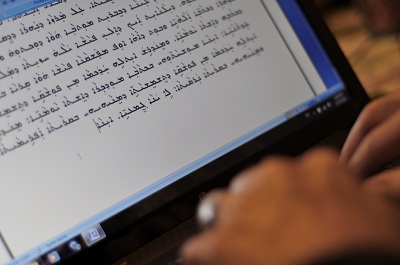

 Sacramento -- In a small apartment in Sacramento California, there lives a Seventy-two year old Assyrian Deacon named Elisha Simon who spends many of his hours typing away on his computer; translating hand-written Aramaic texts into Assyrian Neo-Aramaic.
Sacramento -- In a small apartment in Sacramento California, there lives a Seventy-two year old Assyrian Deacon named Elisha Simon who spends many of his hours typing away on his computer; translating hand-written Aramaic texts into Assyrian Neo-Aramaic.
"For over Forty years, I have been doing this," he told me as we drank tea at his kitchen table, "Each day I spend about six hours, on average."
Through the reflection in the window across from me, I could see his wife Ramziya standing in the kitchen, nodding her head in agreement. "Should I pour you another tea broonee? [my son]" She asked as soon as we made eye contact through the reflection.
Before I could answer, my tea cup was already filled, and there she was sitting next to us at the table.
"So what exactly are these documents that you're translating?" I asked Elisha.
"Well, the biggest of my work has been the seven volumes containing the stories of Martyrs and Saints, Sharbe d'Sahde; I have translated various documents written by Assyrian bishops and priests--The Book of the Bee or Ktawa d'Dabasha being the most popular one; I have translated and digitized the hand-written constitution of the Assyrian Church of the East; and one of my recent projects was an Aramaic/Assyrian Neo-Aramaic/Arabic/English dictionary containing around five thousand words--I finished that too. Whatever Aramaic texts we've written, I want to get my hands on to translate into the dialect that we are speaking today, Assyrian."
 The ancient Assyrian language is classified as Akkadian, which was written in cuneiform and spoken by ancient Assyrians and Babylonians as early as 2800 B.C. Aramaic, a similar language from the region, became the next official language in 752 B.C. Because Aramaic was similar to Akkadian and more systematic containing only 22 letters compared to the roughly 600 characters of the cuneiform system, it rapidly integrated and became the lingua franca of the region. As a result, modern day Assyrian people speak a language that is mainly comprised of Akkadian and Aramaic, and with a modicum of invading Arabic, Farsi, Greek, and Turkish. Linguists have classified this language as Assyrian Neo-Aramaic.
The ancient Assyrian language is classified as Akkadian, which was written in cuneiform and spoken by ancient Assyrians and Babylonians as early as 2800 B.C. Aramaic, a similar language from the region, became the next official language in 752 B.C. Because Aramaic was similar to Akkadian and more systematic containing only 22 letters compared to the roughly 600 characters of the cuneiform system, it rapidly integrated and became the lingua franca of the region. As a result, modern day Assyrian people speak a language that is mainly comprised of Akkadian and Aramaic, and with a modicum of invading Arabic, Farsi, Greek, and Turkish. Linguists have classified this language as Assyrian Neo-Aramaic.
Aramaic, however, has also been preserved among modern day Assyrians since it has long been the official language of the Assyrian Church of the East, which was established in the 1st century A.D. However, because the alphabet used is a bit different from the original Aramaic, linguists prefer to call it Syriac. While the linguists and historians debate on matters of nomenclature and classification, the Assyrians continue to identify themselves and their language as Assyrian and the language of their church as Aramaic.
"Can you show me some of your translated documents?" I asked Elisha.
In an instant, he pulled out a flash drive from his computer bag, connected it to his laptop, clicked into its folder, and presented to me his vast collection of documents among documents. "Eventually, I have to go through and organize all of this," he said, "I have four more of these memory sticks filled to the rim with documents."
The amount of work he had done was impressive. "So I take it you have been making somewhat of a living off of this?" I asked.
He sucked his teeth and waved up his hand--the Assyrian equivalent of yeah right. We looked at one another and laughed.
In Habbaniya, Iraq in 1969, taught by the late Archdeacon Akhiqar Haji, Elisha received his credentials for Aramaic and was immediately ordained a Deacon. However, there was one issue: he couldn't get a hold of Assyrian or Aramaic books to further his study. Most of the books were hand written, and the copies that were available were heavily guarded by their owners.
"There were many of us without books and with a love to read, and a few people with books and without a liking to let us use them," he stated with frustration. "It wasn't right; this had a tremendous impact on me, and it was the one reason why forty years ago I began doing what I am doing: making books that were unavailable to me available to you."
Elisha went on to tell me about the time he got his hands on his first Aramaic book. There was an individual versed in Aramaic who kept a large journal. Inside, he had written wisdom, transcribed passages from other books, and even had accounts of a few saints. Elisha had gone to the man's home and beseeched to borrow it for the night. The individual submitted and demanded that it be brought back to him by sunrise. Although it was evening, Elisha agreed, embraced the book, and ran home not to read it, but to transcribe it. He copied it word for word by hand; he stayed up all night to finish it just before sunrise to return the book.
"Now, with a few contacts that have access to books, and with the help of my friend," he pointed to his computer, "I could more easily translate the texts and compile them into these little brains," he said holding up his flash drive.
"What do you plan to do with them afterwards?" I asked.
"Some get uploaded to an Assyrian-Iraqi forum on www.ankawa.com, the Assyrian Church of the East plans to publish a few, and the rest are here if anybody's interested."
I asked Elisha if he had any other hobbies or talents besides translating.
"You know, at the age of Twelve I played the Dawoola, the large drum accompanied by a Zurna (musette) -- my father taught me how to play," he mentioned as he took in a deep breath of nostalgia. "But what I was most famous for in Habbaniya was the flute."
"The flute, really, do you still play?" I asked with excitement.
He laughed, "Oh, it's been a long time; I haven't played in years. Plus, my true passion is translating our Aramaic texts into Assyrian--I still have a lot of work to do."
Before I got up to leave, Ramziya had poured me yet another tea. So with her and Yacoub their youngest son, I drank my third cup while Elisha continued to type away on his computer.

or register to post a comment.